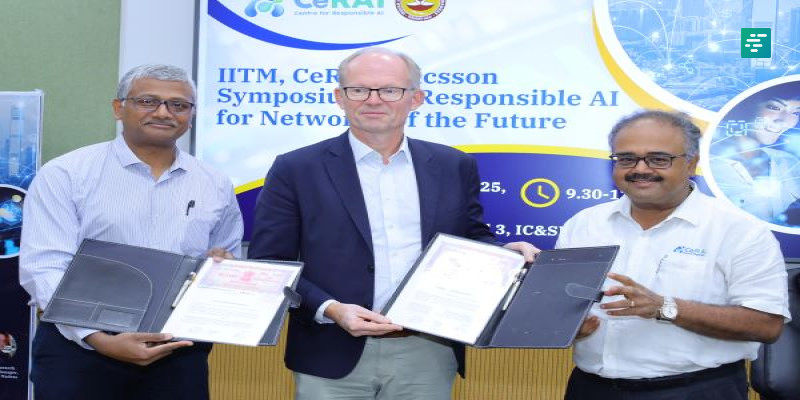
IIT Madras and Ericsson partner for joint research on responsible AI
- Campus Updates
- 27 Sep, 2023
- 953
The Indian Institute of Technology Madras' (IIT Madras) Centre for Responsible AI (CeRAI) on Monday (September 25) announced a strategic collaboration with Ericsson to conduct joint research on responsible AI. The two institutions formalised their partnership during a symposium titled "Responsible AI for Networks of the Future," held at the IIT Madras campus.
At the symposium, leaders from Ericsson Research and IIT Madras congregated to discuss the evolution and developments in the sphere of responsible AI.
Ericsson, a global leader in communication technology, inked an agreement during the event to become a 'Platinum Consortium Member' of CeRAI for the next five years. Under this memorandum of understanding (MoU), Ericsson Research will actively support and participate in all research endeavours undertaken by CeRAI.
The Centre for Responsible AI, an interdisciplinary research hub, aspires to establish itself as a premier institution for both fundamental and applied research in responsible AI. Their mission involves the immediate implementation of AI systems into the Indian ecosystem.
A panel discussion on 'Responsible AI for Networks of the Future' was conducted during the symposium, offering insights into ongoing research projects at the Centre for Responsible AI.
Elaborating on the partnership between CeRAI and Ericsson, Professor B. Ravindran, Faculty Head, CeRAI, IIT Madras, and Robert Bosch Centre for Data Science and AI (RBCDSAI), IIT Madras, said, “Networks of the future will enable easier access to high performing AI systems. It is imperative that we embed responsible AI principles from the very beginning in such systems. Ericsson, being a leader in future networks is an ideal partner for CeRAI to drive the research and for facilitating adoption of responsible design of AI systems.”
Speaking about the work that the collaboration would undertake, Ravindran added, “With the advent of 5G and 6G networks, many critical applications are likely to be deployed on devices such as mobile phones. This requires new research to ensure that AI models and their predictions are explainable and to provide performance guarantees appropriate to the applications they are deployed in.”
Several key projects were presented during the symposium, spanning diverse areas of AI research, such as healthcare, interpretability of AI models, participatory AI, and multi-agent reinforcement learning for intent-based networks.
